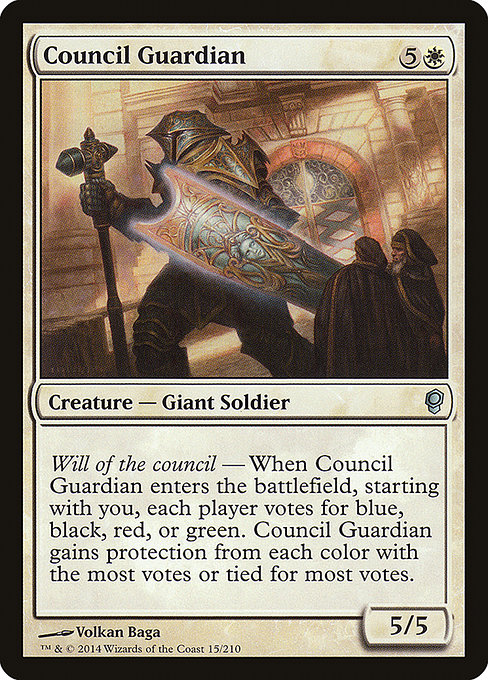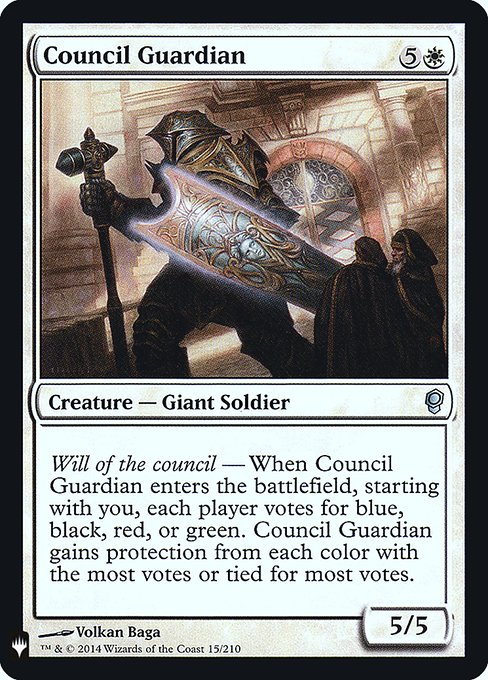standard
future
historic
gladiator
pioneer
explorer
modern
legacy
pauper
vintage
penny
commander
brawl
alchemy
paupercommander
duel
oldschool
premodern
Rulings
If Council Guardian is not on the battlefield when its ability resolves, the vote will still take place; it simply won’t have any effect. However, cards that care about voting (for example, Grudge Keeper) will still see the vote.
The vote happens as the ability resolves. Until this happens, Council Guardian doesn’t have protection from any color. Spells and abilities may target Council Guardian as normal in response to its enters-the-battlefield ability, but not in response to the vote. Once players have started voting, it’s too late to respond.
You must vote for one of the available options. You can’t abstain.
The phrase “the vote is tied” refers only to when there is more than one choice that received the most votes. For example, if a 5-player vote from among three different choices ends 3 votes to 1 vote to 1 vote, the vote isn’t tied.
No player votes until the spell or ability resolves. Any responses to that spell or ability must be made without knowing the outcome of the vote.
Players can’t do anything after they finishing voting but before the spell or ability that included the vote finishes resolving.
Because the votes are cast in turn order, each player will know the votes of players who voted beforehand.
The vote happens as the ability resolves. Until this happens, Council Guardian doesn’t have protection from any color. Spells and abilities may target Council Guardian as normal in response to its enters-the-battlefield ability, but not in response to the vote. Once players have started voting, it’s too late to respond.
You must vote for one of the available options. You can’t abstain.
The phrase “the vote is tied” refers only to when there is more than one choice that received the most votes. For example, if a 5-player vote from among three different choices ends 3 votes to 1 vote to 1 vote, the vote isn’t tied.
No player votes until the spell or ability resolves. Any responses to that spell or ability must be made without knowing the outcome of the vote.
Players can’t do anything after they finishing voting but before the spell or ability that included the vote finishes resolving.
Because the votes are cast in turn order, each player will know the votes of players who voted beforehand.
Rulings
If Council Guardian is not on the battlefield when its ability resolves, the vote will still take place; it simply won’t have any effect. However, cards that care about voting (for example, Grudge Keeper) will still see the vote.
The vote happens as the ability resolves. Until this happens, Council Guardian doesn’t have protection from any color. Spells and abilities may target Council Guardian as normal in response to its enters-the-battlefield ability, but not in response to the vote. Once players have started voting, it’s too late to respond.
You must vote for one of the available options. You can’t abstain.
The phrase “the vote is tied” refers only to when there is more than one choice that received the most votes. For example, if a 5-player vote from among three different choices ends 3 votes to 1 vote to 1 vote, the vote isn’t tied.
No player votes until the spell or ability resolves. Any responses to that spell or ability must be made without knowing the outcome of the vote.
Players can’t do anything after they finishing voting but before the spell or ability that included the vote finishes resolving.
Because the votes are cast in turn order, each player will know the votes of players who voted beforehand.
The vote happens as the ability resolves. Until this happens, Council Guardian doesn’t have protection from any color. Spells and abilities may target Council Guardian as normal in response to its enters-the-battlefield ability, but not in response to the vote. Once players have started voting, it’s too late to respond.
You must vote for one of the available options. You can’t abstain.
The phrase “the vote is tied” refers only to when there is more than one choice that received the most votes. For example, if a 5-player vote from among three different choices ends 3 votes to 1 vote to 1 vote, the vote isn’t tied.
No player votes until the spell or ability resolves. Any responses to that spell or ability must be made without knowing the outcome of the vote.
Players can’t do anything after they finishing voting but before the spell or ability that included the vote finishes resolving.
Because the votes are cast in turn order, each player will know the votes of players who voted beforehand.
Your collection? Your decks?
Want to manage your collection and/or create decks?


 0
0
 0.21€
0.21€
